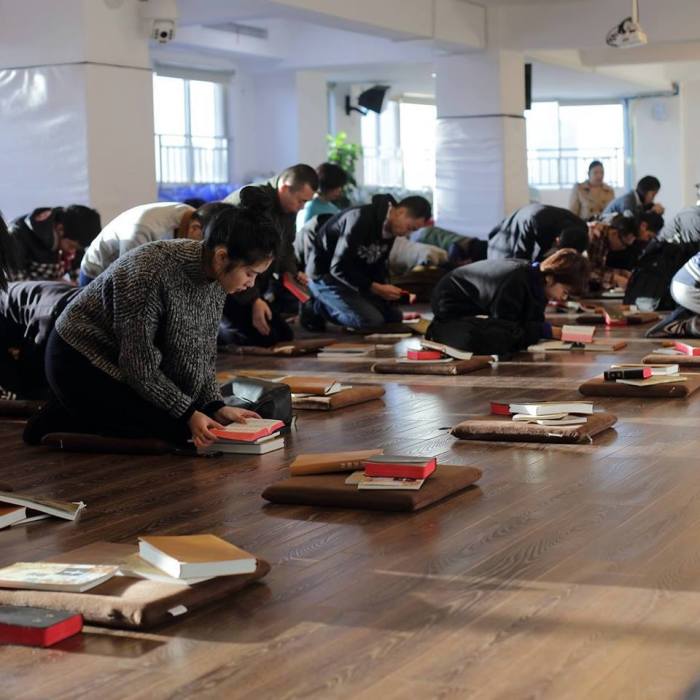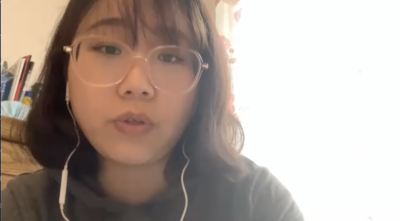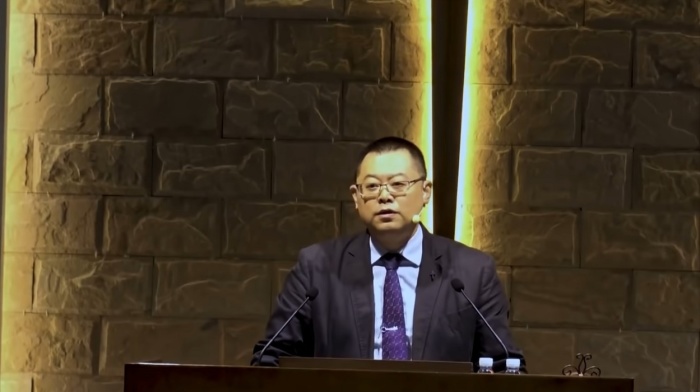Early Rain Church member recounts 'evil' persecution in China, dramatic escape to US

This is part 7 of The Christian Post’s series on China’s human rights abuses under the spotlight of the Olympic Games and features the testimony of a Christian woman who was persecuted under the communist regime. Read part 1, part 2, part 3, part 4, part 5 and part 6.
Ren Ruiting will forever remember Dec. 9, 2018, as one of the most terrifying and life-altering days in her life.
She had just attended a rehearsal for the upcoming Christmas event at Early Rain Covenant Church in Chengdu, China, and decided to go to dinner. Suddenly, her phone began buzzing — and the messages were unnerving.
“I started getting messages that police were arresting our church leaders and taking members from their homes,” she recalled in a recent interview with The Christian Post.

At first, the 22-year-old didn’t think much of the messages.
“It was quite normal for us to face this kind of persecution,” she said. “People would go with the police officer for a couple of hours and then come back, so I wasn’t too nervous at that time.”
But soon, the messages became increasingly concerning.
“I heard that our pastor, Wang Yi, and his wife had been detained, and I started to get worried,” she said. “I was talking to my friend, and suddenly she went silent. It was a horrible thing. One second someone would be talking to you, and then they would disappear. You don’t know where they went, because they are taken away by the policeman. And that made me feel a little afraid.”
Ren, who had attended the church’s seminary and knew the police had her name, feared she was next.
“The night was very, very cold,” she said. “I gathered a water bottle, some clothes and some money, and I traveled to a friend’s house.”
While hiding at her friend’s house, Ren attempted to text her family and friends but discovered her WeChat, a popular Chinese social media app, was no longer working. The police began calling her, prompting her to remove the SIM card from her phone.
“We could no longer connect with each other; all I got was a message saying my WeChat was illegal,” she said. “I didn’t know what happened to my friends, and they didn’t know what happened to me. We all felt independent and isolated. We were not a big group, we were taken away one person at a time. At that time, I felt really afraid.”
“I felt I should disappear and never let them find me because if they find me, maybe they will send me to prison or beat me. I don’t know. I’m just afraid.”
China’s crackdown on house churches
With Beijing hosting the 2022 Winter Olympics, many have expressed outrage about China’s treatment of religious minority communities. While China is being accused of genocide for its detainment of Uyghur and other ethnic Muslims in western China, human rights activists have voiced concern for years about the Chinese government’s yearslong crackdown on unregistered churches and house church movements.
Open Doors USA, a watchdog organization that monitors persecution in over 60 countries, warns that the monitoring of unregistered house churches in China increased over the last year as more house churches have experienced “harassment and obstruction once their activities have been discovered.”
The organization reports that China’s regulations on religion continue to be implemented in a “very strict” manner, especially after new regulations for religious institutions were implemented last year.
“There have been a few reports of unregistered churches being harassed and/or shut down as a result in the [Open Doors] 2022 reporting period,” a December 2021 Open Doors country dossier on China reads. “[T]he authorities seem to prefer simply not to allow churches to open again after lifting COVID19 restrictions.”
Open Doors warns that many unregistered churches have been “forced to split up into small groups and gather in different locations, keeping a low-profile so as not to be detected by the sub-district officer or neighborhood committee.”
As for Early Rain, one of the most well-known unregistered Presbyterian churches in China with over 500 members, December 2018 was not the first time the Chinese Communist Party cracked down on the congregation.
In 2008, police raided an Early Rain prayer meeting and detained Pastor Wang, a well-known scholar and trained lawyer, and 200 other church members. All were released in 24 hours.
But a decade later, the raid was different.
Claiming ERCC had violated religious regulations because it was not registered with the government, authorities ransacked and sealed the church’s properties, including offices, a kindergarten, a seminary, a Bible college and searched the homes of many of its members.
Police also forced church members to sign a pledge not to attend the church again.
In 2019, Wang was sentenced to nine years in prison on charges of subversion of power and illegal business operations. The pastor, who had publicly taken positions on politically sensitive issues, including forced abortions and the massacre that crushed the Tiananmen Square democracy movement in 1989, was also deprived of his political rights for three years and $7,200 (50,000 renminbi) of his personal assets were seized.
“Pastor Wang Yi was not only persecuted for his religious beliefs but he was also persecuted because he spoke up for human rights,” Ren told CP. “He was persecuted in a very, very terrible way. To this day, his wife and his son are guarded at home and their every movement is monitored.”

The events of December 2018 prompted Ren and her family to plan their escape from China, a country she described as increasingly hostile to their religious beliefs.
Ren converted to Christianity at the age of 16, along with her whole family. Since that moment, she said, their faith guided their every move.
After several days of hiding from the police, the young woman finally went to the police station. She was urged to sign a paper saying she would stop attending Early Rain worship services, stop engaging in a cult, and instead participate in the government’s correction work.
“I agreed to the first two since the church was already shut down,” she said. “But I was afraid that if I agreed to the third, they would take me to a re-education camp.”
Eventually, Ren was permitted to leave the police station after giving police her WeChat account to monitor her whereabouts. She returned home, where over a dozen police sat outside her door, tracking her every move.
“My mom took my two younger brothers back to her hometown for safety and security, so it was just me, my boyfriend at the time, and my father,” she said. “Every move we made was monitored. [We all] wanted to go out for Christmas dinner but the policeman didn’t allow us to do that. When we were finally allowed to go, seven police officers followed us. I couldn’t shop or go to my part-time job without being watched.”
Eventually, police stopped guarding Ren’s apartment but still forced her to report to the station for questioning, share her whereabouts and continued to monitor her digitally. She described feeling like she was living in a “prison,” adding: “It was terrible.”
Ren’s story is not uncommon for members of ERCC. Overall, police had detained over 100 people associated with the church. Though most of them were released, the church, now meeting in coffee shops, online and in homes, faced continued harassment and monitoring from the CCP, even amid the COVID-19 outbreak.
Police threatened to send the children of church members to government re-education camps. In one case, authorities removed four adopted children from one ERCC family, returned them to their biological parents and eventually dispersed them among other homes.
This incident particularly unnerved Ren, as her youngest brother, Jiawen, was adopted. The 3-year-old boy suffered from a cancerous tumor in his right arm, and his family feared that should he be taken away and sent to a state orphanage, he would be unable to receive medical care.
“The Chinese government did such terrible things to that family and to their babies, and we were afraid it would happen to us, too,” she stated. “We were so afraid they would take my brother away and put him in a very bad situation.”
The government also forced the family to send their older son, David, to a state-run school instead of Early Rain’s unregistered Christian school. Ren stressed that though this would not be considered persecution in Western countries, because Christianity is considered a “cult” in China, Christian children who attend public schools are ostracized and bullied.
“For these reasons, we were desperate to leave China,” she said.
Fleeing China
Attempting to get a visa to the United States, Ren lied to the police and said she was returning to her hometown. Instead, she visited the U.S. Consulate in Chengdu, but her visa application was denied.
In May 2019, Ren and her now-husband flew to Thailand, where she contacted Bob Fu of the Texas-based watchdog organization ChinaAid.
Fu advised them to travel to Taiwan, an island off the coast of mainland China, on 15-day medical tourism visas.
“I was educated in the public school in China, so I never thought about Taiwan as a place that could help me because they won’t teach you that in Chinese schools,” she said. “Taiwan helped me and my family so very much.”
Thanks in part to the efforts of Fu and the Taiwan Association for Human Rights, as well as the publicity surrounding the plight of Early Rain, the family stayed in Taiwan for two years.
The Presbyterian Church of Taiwan came alongside the family, providing them with housing, schools and even medical treatments. More importantly, the family could worship in a church, freely, for the first time in months.
Ren and her family finally arrived in the U.S. in June 2021 after being granted political asylum, though the pandemic slowed their flight by over a year. Today, they live in Florida, where life looks drastically different — for the better.
Despite fleeing China, Ren struggles to trust those around her, and her name is relatively well-known due to her willingness to share her story with the media and call out the human rights abuses in China.
“I know some spies are in America from China that threaten to prosecute Chinese refugees,” she said.
Bravery comes with a cost
Ren’s bravery has come at a cost, saying that other members of ERCC and her former friends in China are now afraid to speak to her.
She believes her WeChat is still monitored and doesn’t contact family members back home out of concern for their safety. Some of her relatives, including her grandfather, are angry she shared her story and refuse to speak with her.
“But I never regret this,” she said, “because I think about our pastor who is still in prison. I think about his wife, still monitored by police. I think about the children the government lies to, and I cannot remain silent. That’s why I share my story.”
Based on her experience, Ren warned the U.S. against fraternizing with China and urged the country to focus on the human rights abuses carried out by what she dubbed an “evil” Communist administration.
“American people are so good and kind, and they trust instantly,” she said. “But the CCP does not deserve your trust. You need to treat them as liars; you cannot trust anything they say. Maybe they help your economy or give you code for Google or Apple, but life is not just about money. It’s about human rights. If you receive money from China, that means you’ll be influenced by them. And it’s not a good thing.”
But more importantly, Ren urged the Western Church to pray for those persecuted in China, stressing that a tactic by the CCP is to isolate believers, alienating them from any hope of a brighter future.
“Please pray for them,” she said. “Some people in China are not only persecuted, but they don’t know what’s going on in the world. Many cannot read English, and all they know about Christians is that they are a ‘cult’ because that’s what they are taught. Please stand by them. Please let them know you stand with them. Let them know you are praying for them and are standing for their rights.”
Leah M. Klett is a reporter for The Christian Post. She can be reached at: leah.klett@christianpost.com




























